1. Early Life and Skating Career
Fabian Bourzat's early life was characterized by extensive travel due to his father's profession, and he began his journey in ice dancing at a young age, developing foundational skills before forming his most notable partnership.
1.1. Early Life and Education
Fabian Bourzat was born on 19 December 1980 in Nantes, France. He has two older brothers. As a child, his family traveled extensively due to his father's work, living in various countries across Africa and the Pacific Rim before returning to France when he was seven years old. Upon his return, he enrolled in a skating club in Brive-la-Gaillarde. Beyond his athletic pursuits, Bourzat also pursued academic studies, attending the Higher Institute of Osteopathy of Lyon, where he studied osteopathy. In 2023, he married French single skater Laurine Lecavalier.
1.2. Beginning of Skating Career
Bourzat began skating at the age of six or seven, focusing on ice dancing from the very beginning. During his early years, he was coached by Dominique Kernersson. He formed early partnerships with various skaters, including Caroline Truong, Emeline Leroux, and Albane Saillou, though these partnerships were not long-lasting.
2. Partnership with Nathalie Péchalat
Fabian Bourzat's most significant and enduring partnership was with Nathalie Péchalat, a collaboration that defined his competitive career and led to numerous national and international accolades.
2.1. Formation and Early Partnership
In 2000, Bourzat was partnered with Nathalie Péchalat by their then-coach, Muriel Zazoui. Initially, the two did not get along well due to their differing personalities. However, over time, they developed a strong friendship and a highly effective on-ice dynamic. Péchalat described Bourzat as an ideal skating partner, noting his natural talent and ability to interpret movements through feeling and inspiration without needing to over-intellectualize. Bourzat, in turn, highlighted Péchalat's extraordinary work capacity and her consistent drive to push the pair forward and strive for perfection.
From 2000 to mid-2008, Péchalat and Bourzat were coached by Muriel Boucher-Zazoui and Romain Haguenauer in Lyon, France. During their early years, from 2000 to 2003, they also collaborated with Pasquale Camerlengo.
2.2. Junior Career
Péchalat and Bourzat competed at the junior level for two seasons. During this period, they earned two medals on the ISU Junior Grand Prix circuit, securing silver at the 2000 JGP Harbin and the 2001 JGP SBC Cup. They also participated in the World Junior Figure Skating Championships, finishing 8th in 2001 and 6th in 2002.
2.3. Senior Career Highlights
Péchalat and Bourzat's senior career was marked by a steady ascent through the ranks of international ice dancing, characterized by their artistic development, strategic coaching changes, and consistent medal contention.
2.3.1. Senior Debut and Early Competitions (2003-2006)
Péchalat and Bourzat transitioned to the senior level at the start of the 2002-2003 season. They quickly began to make their mark, winning bronze medals at both the 2003 and 2005 Winter Universiade. Their debut at the World Figure Skating Championships came in 2004, where they placed 20th. They made their European Figure Skating Championships debut in 2005, finishing 12th. The duo competed at the 2006 Winter Olympics in Turin, where they placed 18th.
2.3.2. First Grand Prix Medals and Coaching Changes (2006-2008)
The 2006-2007 season saw Péchalat and Bourzat win their first senior Grand Prix medal, a bronze at the 2006 Skate America. However, Péchalat suffered a broken hand during the winter, causing her to miss approximately eight weeks of training. Despite this setback, they were able to compete at the 2007 World Figure Skating Championships, finishing 12th, though they had to miss the 2007 European Championships.
In the 2007-2008 season, they continued their upward trajectory, earning silver medals at both Skate America and the Cup of Russia. These results qualified them for their first Grand Prix of Figure Skating Final, where they placed 6th. Bourzat underwent knee surgery for a torn meniscus, which forced them to withdraw from the 2008 French National Championships. Nevertheless, they recovered in time to compete at the 2008 European Figure Skating Championships, where they finished 5th, and subsequently placed 7th at the 2008 World Figure Skating Championships.
In July 2008, seeking further development, Péchalat and Bourzat made a significant decision to relocate to Moscow, Russia, to train under renowned coach Alexander Zhulin and his assistant Oleg Volkov. They had previously spent a few weeks with Zhulin in 2007. The move presented initial challenges due to the language barrier and Moscow's high cost of living, but from a skating perspective, they considered it a beneficial change for their career.
2.3.3. Breakthrough and Olympic Participation (2008-2010)
During the 2008-2009 season, Péchalat and Bourzat competed at Skate Canada and the NHK Trophy on the Grand Prix circuit. After a 3rd-place finish at Skate Canada, they made adjustments to their programs. They then secured a close second place at the NHK Trophy, winning both the original dance and the free dance segments, though they did not qualify for the Grand Prix Final that season. In December 2008, they achieved a significant milestone by winning their first French national title. At the 2009 European Figure Skating Championships, they were second in the free dance and placed fourth overall, narrowly missing a medal by less than half a point. They concluded the season with a 5th-place finish at the 2009 World Figure Skating Championships.
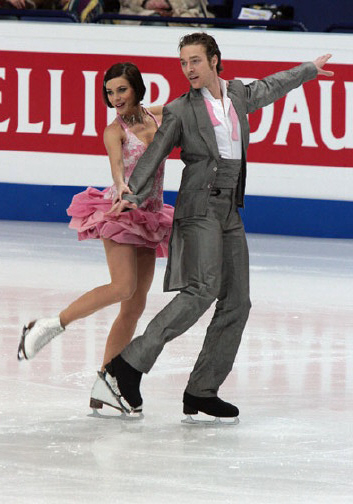
For the 2009-2010 season, their Grand Prix assignments were the Trophée Eric Bompard and Skate Canada. They finished second in both events, behind Canadian rivals Tessa Virtue and Scott Moir, which qualified them for their second Grand Prix Final. Despite Bourzat suffering an ankle injury before the final, they performed well enough to earn their first Grand Prix Final medal, a bronze. Following a second consecutive 4th-place finish at the 2010 European Figure Skating Championships and a 7th-place finish at the Vancouver Olympics, Péchalat and Bourzat decided to revert to their "Circus" free dance from the 2008-2009 season. This decision proved effective, as they finished 4th at the 2010 World Figure Skating Championships, achieving new personal best scores in the compulsory dance, free dance, and overall. They also won the small bronze medal for their free dance performance.
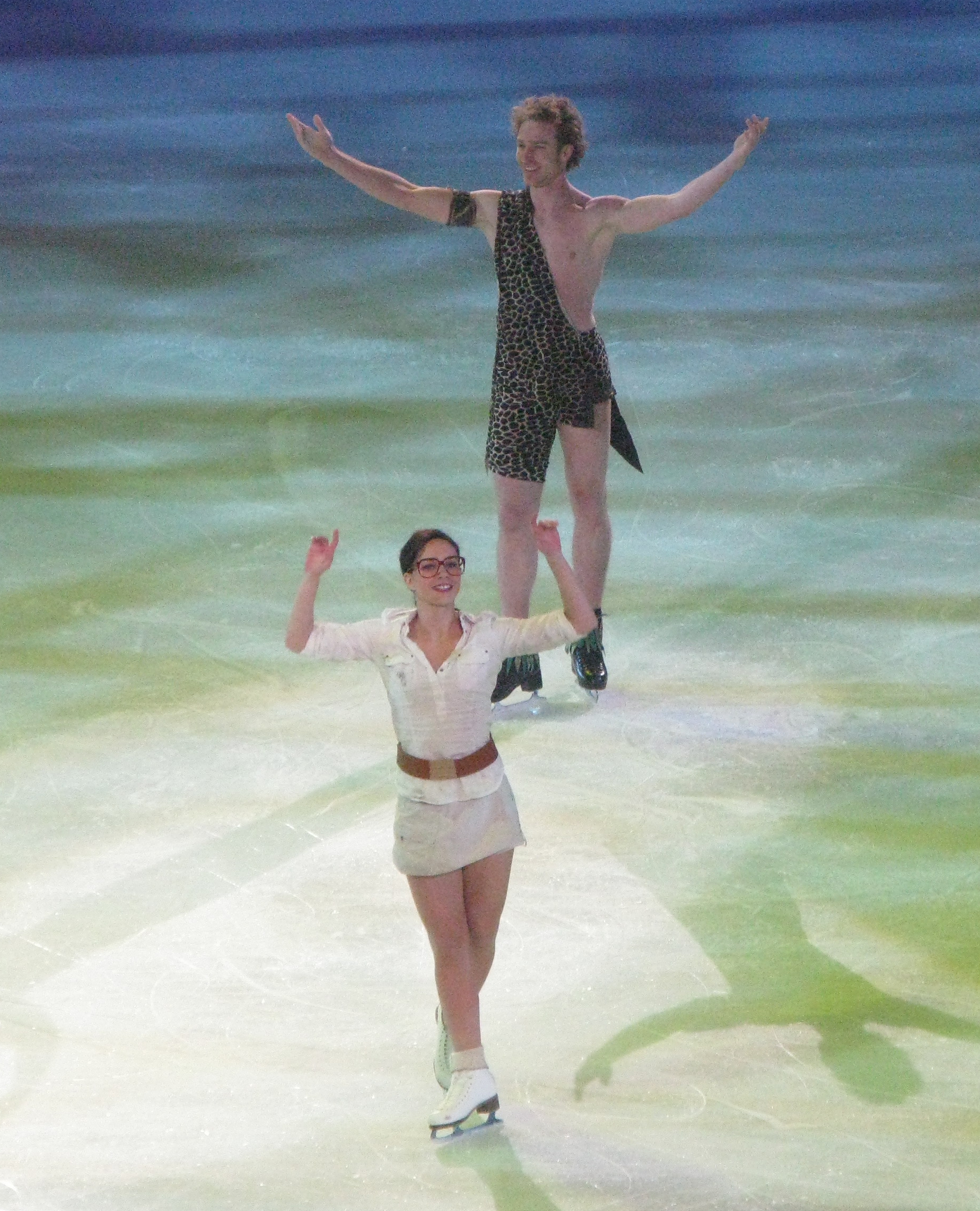
2.3.4. European Champions and World Medal Contention (2010-2012)
The 2010-2011 season marked a significant breakthrough for Péchalat and Bourzat. They started with victories at the Nebelhorn Trophy and the Finlandia Trophy, with the former being their first international gold medal at any level. They initially used music from Amélie for their short dance but replaced it with Doctor Zhivago before the 2010 Cup of China. Their programs scored highly, leading them to win their first Grand Prix event by a substantial margin. They secured their second Grand Prix title at the 2010 Trophée Eric Bompard, setting new personal best scores of 65.48 in the short dance and 96.34 in the free dance. These results qualified them for the 2010-2011 Grand Prix of Figure Skating Final, where they earned the silver medal. They then went on to win their second French national title. At the 2011 European Figure Skating Championships, they delivered strong performances in both the short dance and free dance to claim the gold medal, setting new personal bests in both segments. This marked their first medal at an ISU Championship and secured France's fifth ice dancing European title.
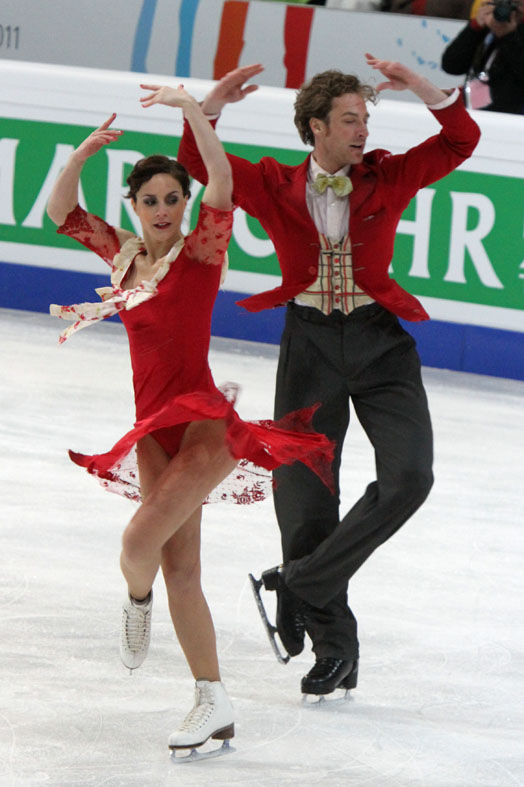
In mid-February 2011, Péchalat and Bourzat participated in galas in North Korea alongside other international skaters. Bourzat emphasized that their visit was not a political act, but rather an opportunity to discover and engage in cultural exchange with an open mind.
At the 2011 World Figure Skating Championships, Péchalat and Bourzat achieved a new personal best in the short dance, placing them in bronze medal position heading into the free dance. However, a fall by Bourzat during a step sequence, which also caused Péchalat to fall, led them to drop to fourth place overall. Following the event, reports indicated that the pair would move to Michigan, United States, to train with Anjelika Krylova and Pasquale Camerlengo.
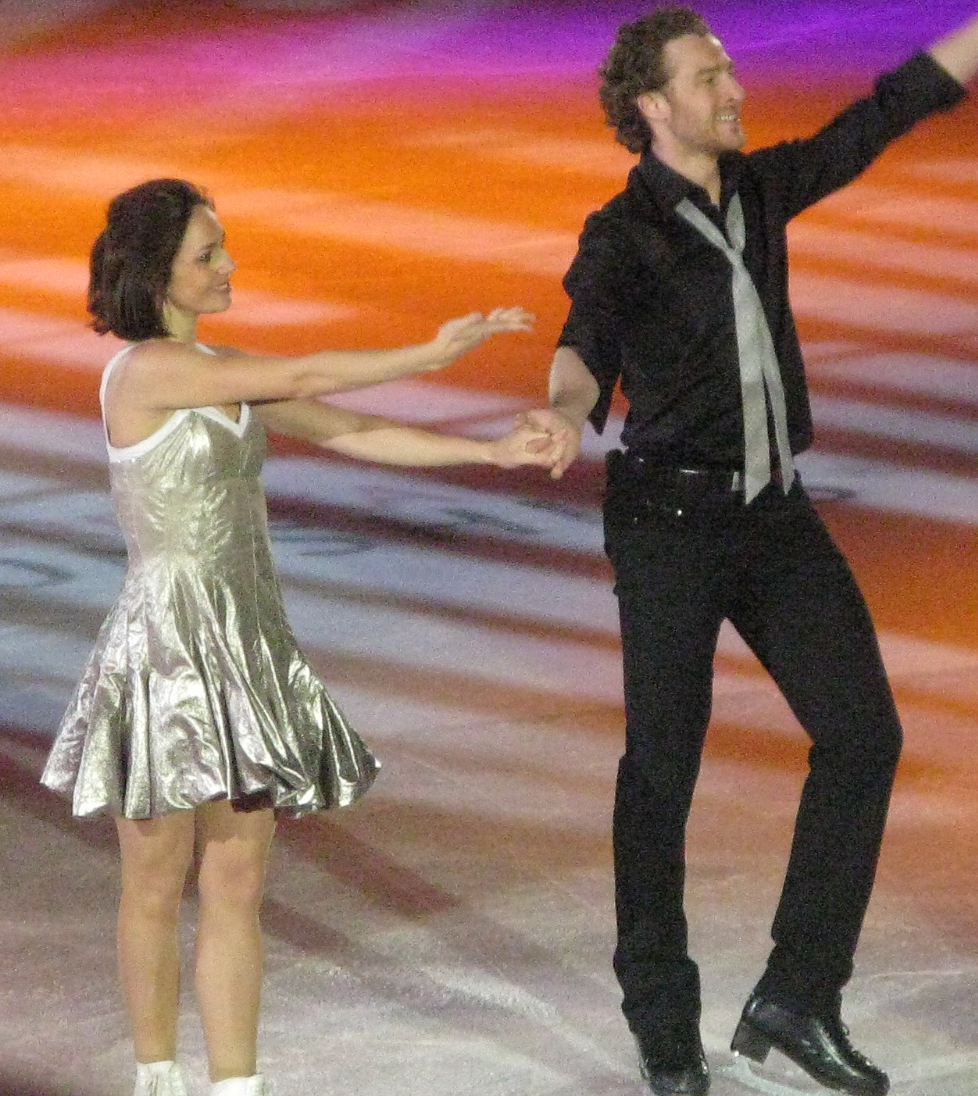
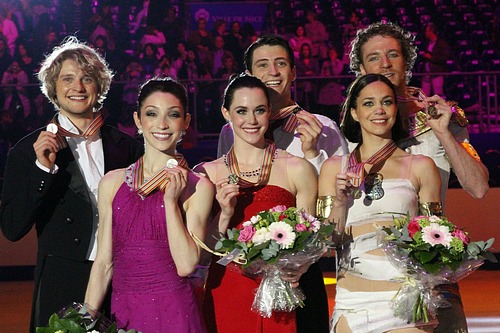
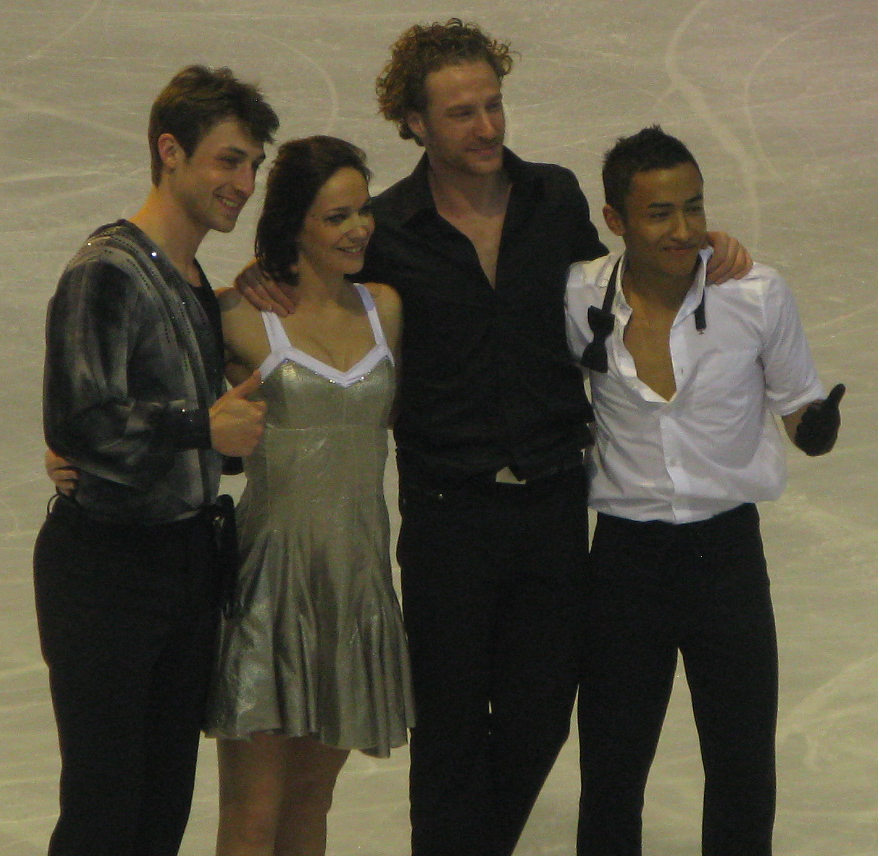
2.3.5. Continued Success and Olympic Season (2012-2014)
In May 2011, Péchalat and Bourzat confirmed their relocation to the Detroit Skating Club in Bloomfield Hills, Michigan, for the 2011-2012 season. They stated that Camerlengo was their only coaching consideration, given their positive past experience with him during their junior years in Lyon. They also sought to continue the technical foundations they had learned under Zhulin, as Krylova was seen as perpetuating his basic techniques. They maintained good relations with Zhulin and Volkov. In Michigan, their training regimen included three hours on ice daily, supplemented by off-ice training, and they resided close to the rink. During the summer, they also spent time in Lyon to collaborate with choreographer Kader Belmoktar on their Egypt-themed free dance.
Péchalat and Bourzat opted to compete at three Grand Prix events in the 2011-2012 season: Skate America, Skate Canada International, and the Trophée Eric Bompard. Despite Bourzat suffering from bronchitis, they secured a silver medal at Skate America. However, Bourzat's illness led them to withdraw from Skate Canada. After winning a silver medal at the Trophée Eric Bompard, they qualified for their fourth Grand Prix Final, where they earned a bronze medal with a new personal best score in the free dance. Their next competition was the French Figure Skating Championships, where they claimed their third national title.
At the 2012 European Figure Skating Championships, Péchalat and Bourzat were in second place after the short dance but rallied in the free dance to win their second consecutive European title. On 13 March, Péchalat sustained a broken nose during a training accident involving a mistake during their twizzles. She initially wore a mask and planned to delay surgery until after the 2012 World Figure Skating Championships. On March 25, they confirmed their participation in the World Championships, stating that surgery would not be necessary. At the World Championships in Nice, France, they achieved a season's best score in the short dance and a personal best score in the free dance, ultimately securing their first World medal, a bronze.
For the 2012-2013 season, Péchalat and Bourzat continued their success, winning gold medals at both of their assigned Grand Prix events, the 2012 Cup of China and the 2012 Trophée Eric Bompard. These victories qualified them for their fourth consecutive Grand Prix of Figure Skating Final, where they earned a bronze medal. On 9 January 2013, Bourzat suffered a partial tear of the adductor muscle in his right leg, which led to their withdrawal from the 2013 European Figure Skating Championships. Despite the injury, the duo decided to compete at the 2013 World Figure Skating Championships, partly motivated by the desire to secure two spots for French ice dancers at the upcoming 2014 Winter Olympics. They finished 6th at the event. On 20 May 2013, following a suggestion from the French skating federation, Péchalat and Bourzat announced another coaching change, moving to train with Igor Shpilband in Novi, Michigan.
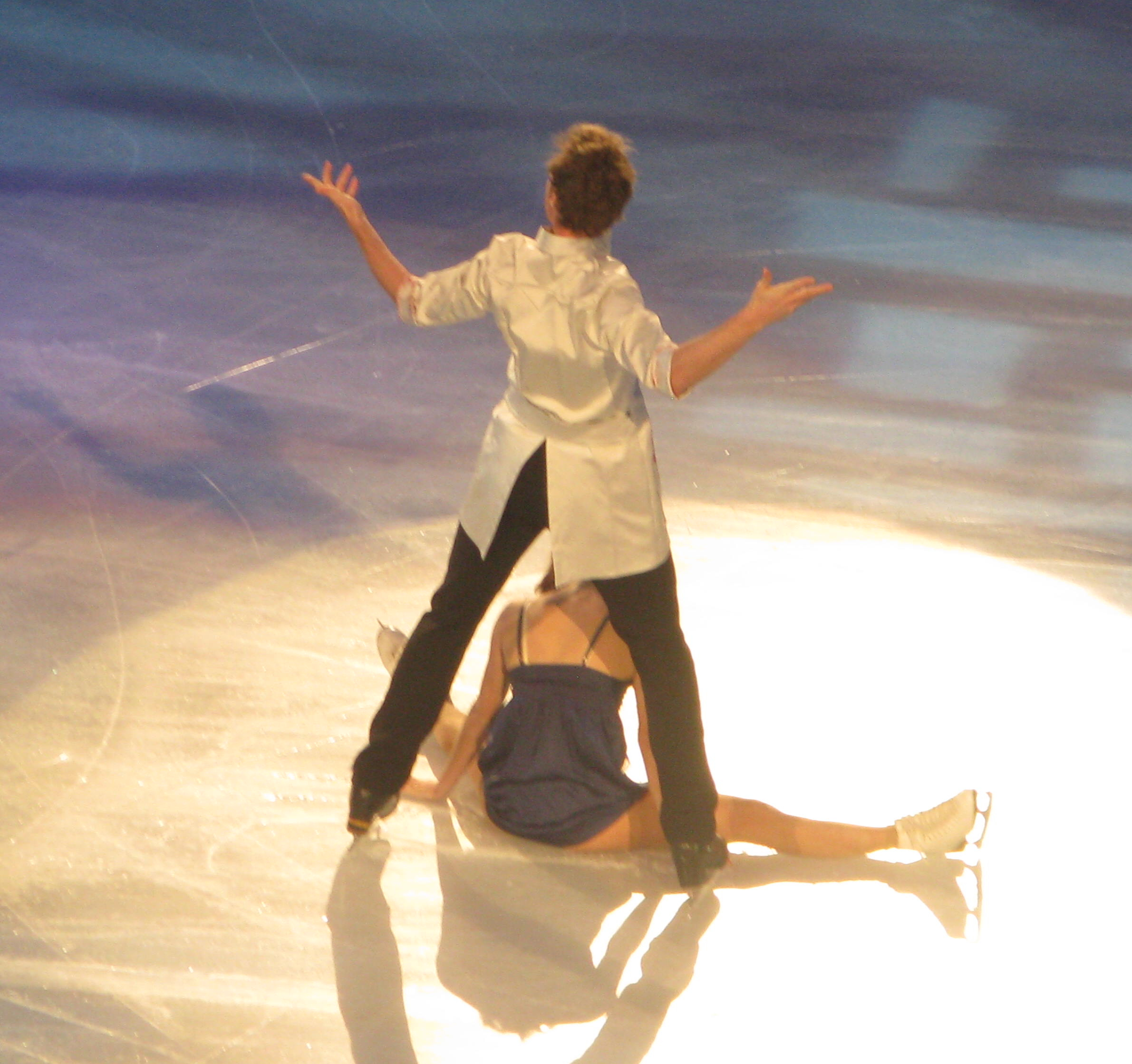
In their final competitive season, 2013-2014, Péchalat and Bourzat won gold at the 2013 Cup of China, ahead of Ekaterina Bobrova and Dmitri Soloviev. They then earned a bronze medal at the 2013 Trophée Eric Bompard, placing behind Tessa Virtue and Scott Moir, and Elena Ilinykh and Nikita Katsalapov. At the 2013-2014 Grand Prix of Figure Skating Final in Fukuoka, Japan, the French pair secured their fifth consecutive medal at the event, another bronze. They concluded 2013 by winning their fifth national title. To prioritize their preparation for the Olympics, they withdrew from the 2014 European Figure Skating Championships.
Péchalat and Bourzat placed fourth at the 2014 Winter Olympics in Sochi, Russia. They achieved personal best scores in both the short dance and the free dance during the competition. Although they initially planned to retire immediately after the Olympics, they ultimately decided to conclude their competitive careers at the 2014 World Figure Skating Championships in Saitama, Japan. At the World Championships, they were ranked third in the short dance and second in the free dance, finishing third overall and earning their second World bronze medal. Their final score was a mere 0.06 points behind Italy's Anna Cappellini and Luca Lanotte (gold) and 0.04 points behind Canada's Kaitlyn Weaver and Andrew Poje (silver). Following their retirement from competitive skating, they stated their intention to continue performing together in shows for one or two years. Bourzat also expressed his plan to pursue coaching in collaboration with Shpilband.
3. Programs
Fabian Bourzat and Nathalie Péchalat were known for their creative and diverse programs, often incorporating unique themes and music selections that showcased their artistic range and technical prowess. Their programs were choreographed by a variety of notable figures in the skating world.
| Season | Short dance | Free dance | Exhibition | ||||||||||
|---|---|---|---|---|---|---|---|---|---|---|---|---|---|
| 2013-2014 | Final version:
---- | 2012-2013 |
>Rolling Stones medley:
|
----
|- | 2011-2012 |
>"Mummy and Pharaoh"
|
|- | 2010-2011 |
----
>
|
----
|- | Original dance | |||||
| 2009-2010 |
>Time by Maxime Rodriguez | 2008-2009 |
>Circus theme:
|
----
|- | 2007-2008 |
>
|
|- | 2006-2007 |
>
|
----
|- | 2005-2006 |
>
|
|- | 2004-2005 |
>
|
|- | 2003-2004 |
>
| |
| 2002-2003 |
>
| | ||||||||||||
| 2001-2002 |
>
| | ||||||||||||
| 2000-2001 |
>
| |
4. Major Competitive Results
| International | |||||||||||||||||||||||||||
|---|---|---|---|---|---|---|---|---|---|---|---|---|---|---|---|---|---|---|---|---|---|---|---|---|---|---|---|
| Event | 00-01 | 01-02 | 02-03 | 03-04 | 04-05 | 05-06 | 06-07 | 07-08 | 08-09 | 09-10 | 10-11 | 11-12 | 12-13 | 13-14 | |||||||||||||
| Olympics | 18th | 7th | 4th | ||||||||||||||||||||||||
| Worlds | 20th | 19th | 15th | 12th | 7th | 5th | 4th | 4th | 3rd | 6th | 3rd | ||||||||||||||||
| Europeans | 12th | 11th | 5th | 4th | 4th | 1st | 1st | WD | |||||||||||||||||||
| Grand Prix Final | 6th | 3rd | 2nd | 3rd | 3rd | 3rd | |||||||||||||||||||||
| GP Bompard | 9th | 8th | 8th | 5th | 7th | 2nd | 1st | 2nd | 1st | 3rd | |||||||||||||||||
| GP Cup of China | 7th | 7th | 1st | 1st | 1st | ||||||||||||||||||||||
| GP Cup of Russia | 5th | 2nd | |||||||||||||||||||||||||
| GP NHK Trophy | 2nd | ||||||||||||||||||||||||||
| GP Skate America | 3rd | 2nd | 2nd | ||||||||||||||||||||||||
| GP Skate Canada | 11th | 3rd | 2nd | WD | |||||||||||||||||||||||
| Finlandia | 1st | ||||||||||||||||||||||||||
| Nebelhorn | 1st | ||||||||||||||||||||||||||
| Universiade | 3rd | 3rd | |||||||||||||||||||||||||
| International: Junior | |||||||||||||||||||||||||||
| Junior Worlds | 8th | 6th | |||||||||||||||||||||||||
| JGP Final | 7th | ||||||||||||||||||||||||||
| JGP China | 2nd | ||||||||||||||||||||||||||
| JGP France | 6th | ||||||||||||||||||||||||||
| JGP Japan | 2nd | ||||||||||||||||||||||||||
| JGP Netherlands | 4th | ||||||||||||||||||||||||||
| National | |||||||||||||||||||||||||||
| French Champ. | 1st J. | 1st J. | 3rd | 3rd | 2nd | 2nd | 2nd | 1st | 1st | 1st | 1st | 1st | |||||||||||||||
| Masters | 1st J. | 1st J. | 2nd | 3rd | 1st | 2nd | 2nd | 2nd | 1st | 1st | |||||||||||||||||
| Team events | |||||||||||||||||||||||||||
| Olympics | 6th T | ||||||||||||||||||||||||||
| WTT | 4th T | GP = Grand Prix; JGP = Junior Grand Prix; J. = Junior level; WD = Withdrew. T = Team result; P = Personal result; Medals awarded for team result only. | |||||||||||||||||||||||||
5. Post-Competitive Career
After retiring from competitive ice dancing, Fabian Bourzat transitioned into coaching, aiming to contribute to the sport from a new perspective. He continued to perform in skating shows alongside Nathalie Péchalat for one to two years following their retirement from competition. Bourzat subsequently began a coaching career, collaborating with his former coach, Igor Shpilband, in Novi, Michigan, where he now trains the next generation of ice dancers.
6. Assessment and Legacy
Fabian Bourzat, along with Nathalie Péchalat, left a significant mark on the sport of ice dancing, particularly within French figure skating. Their partnership was characterized by a distinct style that blended strong technical elements with innovative and often dramatic artistic expression. They were known for their unique program themes, which often pushed the boundaries of traditional ice dance, such as their "Circus" and "Mummy and Pharaoh" free dances.
Their journey, marked by perseverance through injuries, multiple coaching changes, and the financial and personal challenges of training abroad, highlights the demanding nature of elite sports. Their ability to adapt and consistently improve, culminating in two European titles and two World bronze medals, underscores their resilience and dedication to their craft. They played a crucial role in maintaining France's strong presence in international ice dancing during their competitive years, inspiring future generations of skaters with their commitment to both athletic excellence and artistic originality. Their legacy is not only in their competitive achievements but also in their contribution to the sport's evolving artistic landscape and their continued involvement in athlete development through coaching.